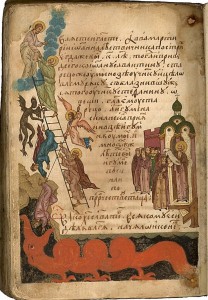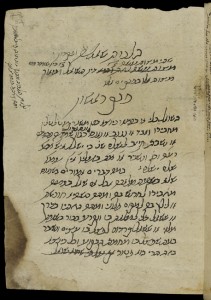Sirach: Wisdom is Obeying God’s Word
Author: Bobby Valentine | Filed under: Apocrypha, Bible, Church History, Exegesis, Hebrew Bible, Jesus, Jewish Backgrounds, King James Version, SirachYeshua (Jesus) Ben Sira, the scribe, lived in Jerusalem during the High Priesthood of Simon II (219-196 B.C.). His work, the longest of the Apocrypha (51 chapters) was written in Hebrew and later translated into Greek by his grandson around 132 B.C. Interestingly enough the grandson reveals what every translator has since lamented. Despite the effort, no translation is perfect, things are lost in translation!
“You are invited therefore to read it with goodwill and attention, and to be indulgent in cases where, despite our diligent labor in translating, we may seem to have rendered some phrases imperfectly. For what was originally expressed in Hebrew does not have exactly the same sense when translated into another language. Not only this book, but even in the Law itself, the prophecies and the rest of the books differ not a little when read in the original.” (The Prologue).
Though Sirach wrote in Hebrew his work was not preserved in Hebrew, or so it was thought for years. He was known to most of the early church in Greek. But since 1896 there has been a steady stream of discoveries of ancient manuscripts of Sirach in Greek, Latin and even Hebrew. Sirach has been discovered in Cave 2 and Cave 11 of Qumran and was also discovered at Masada (for more on the text of Sirach see Patrick Skehan and Alexander Di Lella, The Anchor Bible: The Wisdom of Ben Sira, pp. 51-62). Like many of the other Apocryphal writings (Wisdom, Tobit, Judith, etc) Ben Sira was a popular, and influential, work among both Jews and Christians. Attesting to its significance Sirach survives in these ancient translations: Latin, Armenian (two versions), Georgian, Old Slavonic, Arabic, Ethiopic and Coptic. Another indication of the popularity of the book in the early church is its Latin name: Ecclesiasticus. Ecclesiasticus means “The Church Book.” Sirach was used to instruct young believers in ancient catechetical schools.
Most scholars believe on the basis of 51.23, “Draw near to me, you who are untaught, and lodge in the house of instruction” that Ben Sira conducted an “academy” of sorts in his house in Jerusalem.
Martin Luther on The Wisdom of Ben Sira
It is amazing how both Protestants (especially Evangelicals) and Catholics seriously misrepresent Luther’s views on the Apocrypha. We have heard the voice of Martin Luther several times as we have studied the Apocrypha (as we have traced the Ancestry of the King James Version) This is appropriate because he, as much as anyone else, has shaped the Canon of the Hebrew Bible as Protestants recognize it. Why he included or excluded certain books sheds considerable light on the Bible as we understand it. And those books called Apocrypha we will see that though excluded in establishing doctrine were by no means to be ignored by God’s People. Listen to the Reformer,
“This book has heretofore carried the Latin title, Ecclesiasticus, which has been understood in German to mean “spiritual discipline.” Through reading, singing, and preaching it has been extensively used and inculcated in the churches, yet with little understanding. . .
This is a useful book for the ordinary man. The author concentrates all his effort on helping citizen or house father to be God fearing, devout, and wise; and on showing what the relationship of such a man should be to God, the Word of God, . . . One might call this a book on home discipline or on the virtues of a pious householder. This indeed is the proper “spiritual discipline,” and should be recognized as such.” (“Preface to Sirach,” Luther’s Works, vol. 35, pp. 347-348).
Theology in Ben Sira
The Wisdom of Ben Sira is most like the book of Proverbs in the Hebrew Bible in form. He is concerned not with secular wisdom but divine wisdom that promotes a distinctive lifestyle for God’s People. A large amount of material is devoted to promoting piety (37. 7-15; 39. 5-8). He calls attention, along with Tobit, to almsgiving, acts of mercy and social justice (3.30; 4.1-10, 31; 7.10, 32-36; 12.1-7; 29.8-13; 34.21-27; 35.15b-26; 40.16-17).
Jesus, the Son of Sirach, addressed not only issues of piety he also meditated on the nature of sin and its source.
“Do not say, ‘It was the Lord’s doing that I fell away’:
for he does not do what he hates.
Do not say, ‘It was he who led me astray’;
for he has no need of the sinful” (15.11-12; cf. James 1.13))
“Have you sinned, my child? Do so no more,
but ask forgiveness for your past sins.
Flee from sin as from a snake; for if you approach sin,
it will bite you. . .
All lawlessness is like a two-edged sword;
There is no healing for the wound it inflicts.” (21.1-3)
For Ben Sira true wisdom recognizes God’s handiwork in the world around us:
“By his command he sends the driving snow
and speeds the lightening of his judgments.
Therefore the storehouses are opened,
and the clouds fly forth like birds . . .
He scatters the snow like birds flying down . . .
He pours hoarfrost upon the earth like salt,
and when it freezes, it becomes pointed thorns.” (43. 13-14, 17)
One of the most interesting sections of the Wisdom of Ben Sira is his Catalogue of Famous Men (chapters 44 to 50). The discerning readers mind will immediately think of the Hebrew Preacher’s “Hall of Fame of Faith” (cf. Hebrews 11).
Let us now praise famous men, and our fathers in their generations.
The Lord appointed to them great glory, his majesty from the beginning.
There were those who ruled in their kingdoms, and were men renowned for
their power, giving counsel by their understanding,
and proclaiming prophecies;
leaders of the people in their deliberations . . .
Peoples will declare their wisdom, and the congregation proclaims their praise.
(Wisdom of Ben Sira 44. 1-4, 7, 15)
Those mentioned in this section include such worthies as Enoch, Noah, Abraham, Isaac, Jacob, Moses, Aaron, Phinehas, Joshua, Samuel, David, Isaiah, etc. Interestingly one who is not mentioned is Daniel.
The Wisdom of Ben Sira in Jesus and the Early Church
Ben Sira had a thorough impact on the world and thought leaders of the early church. Jesus himself, it seems, studied the writings of Ben Sira. Looking at the Lord’s teaching in the Sermon on the Mount and Luke for example the echoes can be striking. Jesus’ Parable of the Rich Fool (Luke 12.13-21) has roots in Jesus’ Son of Sirach’s description the self-absorbed secular man.
“There is a man who is rich through his diligence and self-denial, And this is the reward allotted to him: When he says, ‘I have found rest, And now I shall enjoy my goods!’ He does not know when his time will come; He will leave them to others and die” (Sirach 11.18-19).
Ben Sira’s invitation to the unlearned to come and learn has as striking echo with Jesus’ own moving invitation. Hear the Sage,
“Draw near to me, you who are untaught, and lodge in the house of instruction . . Put your neck und the yoke, and let your souls receive instruction . . . See with eyes that I have labored little and found for myself much rest” (Sirach 51.23, 26-27).
“Come to me, all you that are weary and are carrying heavy burdens, and I will give you rest. Take my yoke upon you, and learn from me; for I am gentle and humble in heart, and you will find rest for your souls. For my yoke is easy, and my burden is light.” (Matthew 11.28-30)
Just as Jesus of Nazareth taught us, not only not to commit murder but not to be angry; so Jesus the Son of Sirach connects getting angry with our neighbor with obeying God’s command,
“Remember the commandments, and do not get angry with your neighbor; remember the covenant of the Most High, and overlook faults.” (Sirach 28.7; cf. Matthew 5.21-22).
Ben Sira and Jesus urge giving to the one who asks:
“Give to anyone who begs from you, and do not refuse anyone who wants to borrow from you.” (Matthew 5.42)
“Don’t refuse to help a beggar who is in distress. Don’t turn your back on a poor person . . .” (Sirach 4.4, Today’s English Version)
Both Jesus and Ben Sira claim that mirroring God’s generous love makes one like a child of God:
“Be a father to orphans, and be like a husband to their mother; you will then be like a son of the Most High . . .” (Sirach, 4.10, cf. Matt. 5.45)
The sage of Jerusalem and the Sage of Nazareth warn against vain repetition in prayer,
“Do not babble in the assembly of the elders, and do not repeat yourself when you pray” (Sirach 7.14, cf. Matt. 6.7)
Both teach we are to call upon God as our “Father” in prayer:
“O Lord, Father and Master of my life . . . O Lord, Father and God of my life . . . (Sirach 23. 1, 4; cf. Matt 6.9; James 3.9)
One arresting echo of Ben Sira appears in Jesus. The Son of Sirach taught that those who hope for forgiveness from God must not harbor unforgiveness against other humans.
“The vengeful will face the Lord’s vengeance, for he keeps a strict account of their sins. Forgive your neighbor the wrong he has done, and then your sins will be pardoned when you pray. Does anyone harbor anger against another, and expect healing from the Lord? If one has no mercy toward another like himself, can he seek pardon for his own sins?” If a mere mortal harbors wrath, who will make an atoning sacrifice for his sins? (Sirach 28. 1-5)
This passage rings many “bells” from the Lord’s Prayer in Matthew 6.
“And forgive us our debts, as we have forgiven our debtors. . . For if you forgive others their trespasses, your heavenly Father Will also forgive you; but if you do not forgive other, neither will Your Father forgive your trespasses.” (Matthew 6. 12, 14-15)
Just as Jesus taught us to give away our possessions to those in need which results in the “laying up a treasure” (Luke 12.33; 18.22; Matt. 19.21) so Sirach did as well.
“Help the poor for the commandment’s sake, and in their need do not send them away empty-handed. Lose your silver for the sake of a brother or a friend, and do not let it rust under a stone and be lost. Lay up your treasure according to the commandments of the Most High, and it will profit you more than gold. Store up almsgiving in your treasury, and it will rescue you from every disaster.” (Sirach 29.9-12).
It is becoming very clear that Jesus was familiar with the teaching of another Jesus and found that teaching to be helpful in expressing his own. There are numerous other points of contact between Ben Sira and other NT writers, especially James, Paul and John. Only one example will be given from John. John knows the value of a clear conscience from Ben Sira:
“Happy/Favored are those whose hearts do not condemn them, and who
have not given up their hope” (Sirach 14.2)
“Beloved, if our hearts do not condemn us, we have boldness before God; and we receive from him whatever we ask” (1 John 3.21-22).
Ben Sira sheds some light on Messianic speculation during the years prior to Jesus. One day some teachers came to Jesus and asked why “Elijah” must come first? Jesus agreed with this understanding and said that he had already come (Mark 9.11-13). Sirach tells us this about “Elijah,”
“You were taken up by a whirlwind of fire, in a chariot with horses of fire. At the appointed time, it is written, you are destined to calm the wrath of God Before it breaks out in fury, to turn the hearts of parents to their children, and To restore the tribes of Jacob.” (Ben Sira 48.11-12)
Indeed Ben Sira’s entire “praise” of Elijah sheds light on why it might be important to Jewish people that Elijah witness to Jesus as he did on the Mount of Transfiguration (cf. Ben Sira 48.1-11).
Conclusion
The Wisdom of Jesus the Son of Sirach casts a long shadow in the history of Christianity. It is well to know this book, first of all, just to know more about the shape of Christianity in its historical form. It is worth reading because it had a profound impact on the Lord himself. The book reminds us of the enormous continuity Jesus the Jew had with his fellow Jews – a point that has often been murderously forgotten! There are things in the book that reflect the cultural values of the time (like Sirach’s views on women but even here Ben Sira is often caricatured rather than understood) that we will not agree with. However those views help us understand the radical difference of Jesus and the early church in its views towards women.





June 20th, 2011 at 7:03 pm
thank you I seem to be getting a little more comfortable, with these books, that I have shyed away from all my life.
Rich
Constant
June 22nd, 2011 at 12:20 am
More a comment on the entire blog than the individual post … this is AMAZING. Great research. It’s like a candy store! Thank you very much!
Herbert S. Hensley
June 23rd, 2011 at 3:03 pm
Thanks again Bobby. All the posts you have made regarding these ancient writings have been interesting and informative. During my upbringing all the emphasis was on the 66 canonical books. I had never heard of most of these books until my 20s or 30s. Even then, I didn’t tke the time to read them or find out much about them.
Hesed,
Randall
July 5th, 2011 at 6:55 pm
I would take issue on your perspective.
just indulge me here for a second.
I F the word was made flesh,
then what you are saying is a testimony of the second and third century jewish teachers,(bc) still guiding the people of god, toward the hinge point, of the fathers healing of the broken very good creation. through the dismantling,, and restoration of the true kingdom and temple worship, long since gone yet to come. and through the hope and faithfulness, of our lord we have attained, because of promise.
I don’t think they influenced the lord at all.
but to the degree that these teachers influenced the lords people, is plane to see on calgiry.
I know that’s an oversimplification bob but I hope you get my drift?
blessings
rich constant
July 5th, 2011 at 7:22 pm
Rich,
The Word did become Flesh. That is genuinely human. If the Word was genuinely human than “he” was subject to human constraints too … thus the language of the Word was Aramaic and perhaps some Hebrew or Greek and not English or Russian or Spanish or Chinese. The word was meshed into space, time … culture. Thus that the Lord was influenced by Sirach bothers me very little. Rather it affirms the reality of the Incarnation.
Blessings brother.
July 6th, 2011 at 2:11 pm
MUCH
more better said bro.
i do truly
murder the English language i won’t even go into my use of punctuation and grammar.
which is why from the 7th grade on school was something that was a paper with red checks all over it!
and all I COULD HEAR MY HEAD SAY EVERY MORNING AS I WOKE UP WAS !!!!
THE BEATINGS WILL CONTINUE
UNTIL MY MORAL IMPROVES!!!
WHO could be happy with a capitol
F….
thank god for spell check.but boy oh boy i love to read.
i do have voice activated software.
although not enough ram to run the stuff,takes min.4gigs’
one day one day.
today i love school
funny how the father teaches us the life lessons we need ya.
thanks bro for teaching…
you are a blessing
rich constant
December 4th, 2022 at 9:18 am
your welcome